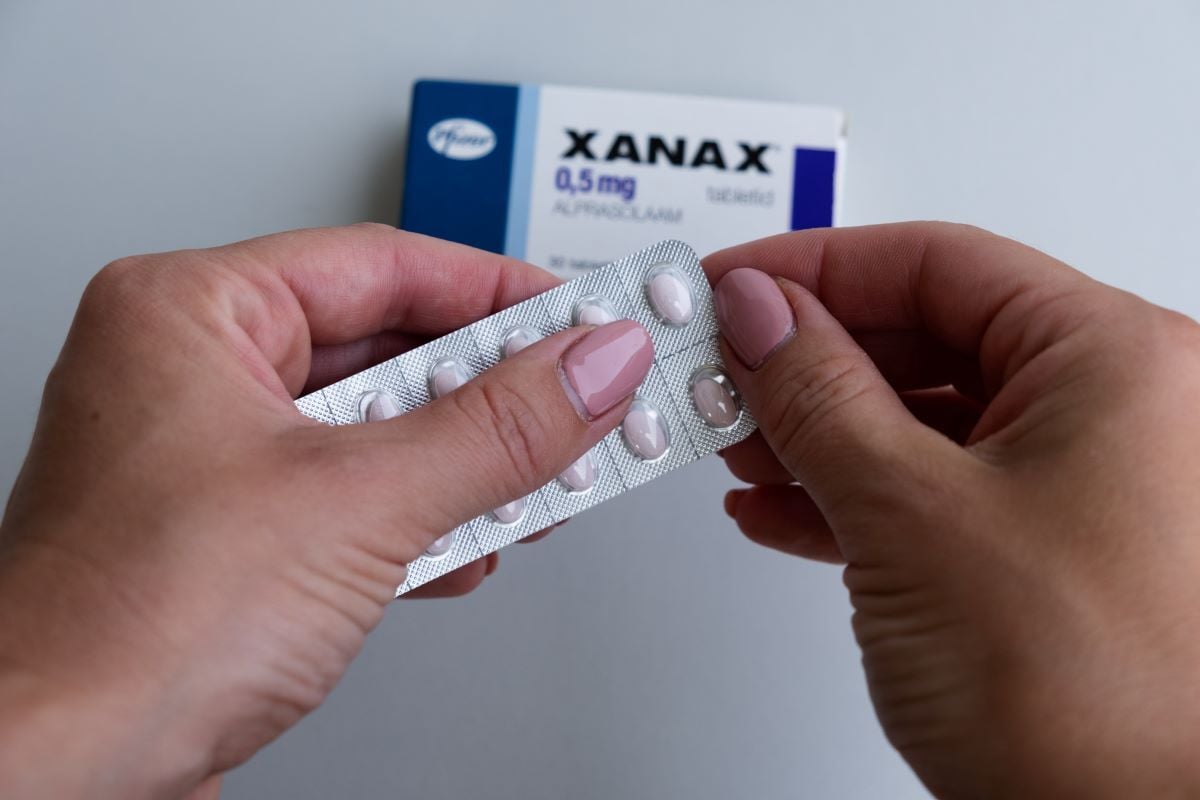Xanax (alprazolam) is one of the most commonly prescribed medications for anxiety and panic disorders, but it’s also one of the most misused. While Xanax can bring relief to those struggling with overwhelming worry or panic, it also carries a high risk of dependence and withdrawal.
Over time, what starts as a helpful tool can quietly become a daily necessity, impacting health, relationships, and quality of life. Recognizing when Xanax use has crossed the line into dependence isn’t always easy, but finding the right treatment is critical for recovery and lasting wellness.
At Avenues Recovery Center, we’ve seen firsthand how the right combination of medical care, therapy, and support can help people reclaim their lives from Xanax addiction.
Kim Vytell, LCADC, LSW, Clinical Director, earned both her BS and MS in social work from Rutgers University and is an EMDR-trained therapist. She recognizes the impact that addiction and trauma have on individuals, and the importance of addressing both in order to live healthy and happy lives. She is dedicated to helping individuals and families who have been affected by the disease of addiction, believing everyone is capable of recovery. Kim is passionate about helping others move beyond their pasts and discover their true selves.
What is Xanax (Alprazolam)?
Xanax, the brand name for alprazolam, is a prescription medication in the benzodiazepine family. It’s most commonly prescribed to treat:
- Anxiety disorders
- Panic disorders
- Short-term management of severe stress
Xanax works by enhancing the calming effects of the brain’s neurotransmitter GABA, which reduces feelings of tension and panic.
While effective when used as directed and for short periods, Xanax carries a high risk of misuse and dependence. Its fast-acting relief can make it tempting to take more than prescribed or to use without a prescription, leading to tolerance, addiction, and dangerous withdrawal if stopped suddenly.
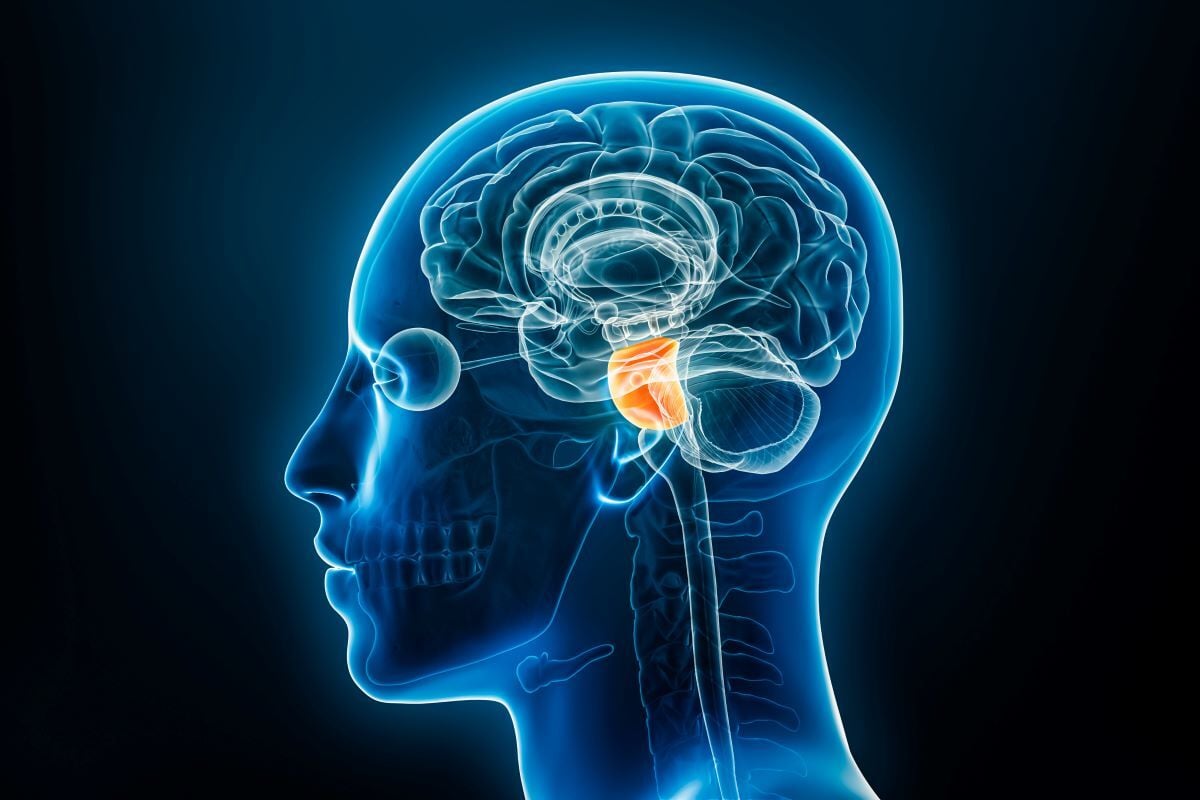
Is Xanax Addictive?
Yes — Xanax is highly addictive, even when taken as prescribed. Because it works quickly to bring relief, the brain can become reliant on it. Over time, tolerance develops - meaning higher or more frequent doses are needed.
Early signs of Xanax misuse may include:
- Taking higher doses than prescribed
- Using more often than directed
- Feeling anxious or irritable when a dose is missed
- “Doctor shopping” for extra prescriptions
- Recreational use for calming or euphoric effects
- Neglecting responsibilities due to drowsiness or brain fog
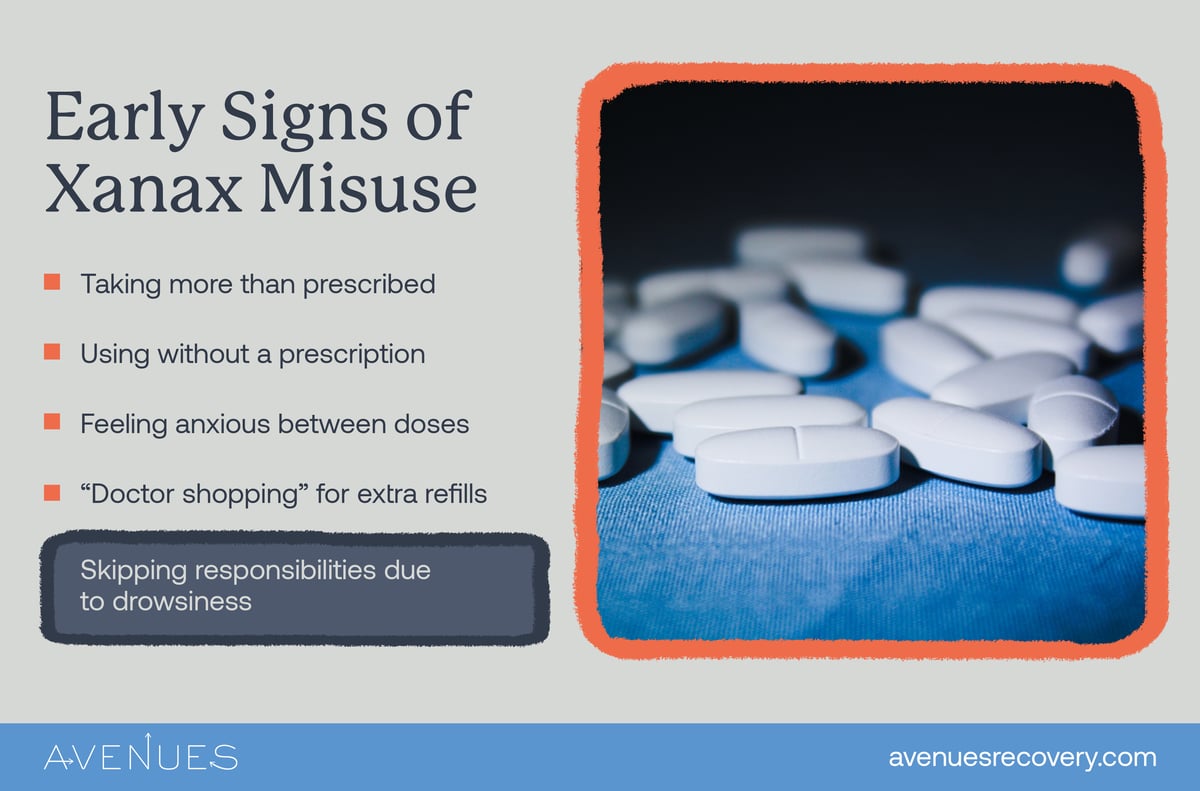
Xanax Withdrawal
When someone becomes dependent, stopping Xanax suddenly can cause intense and dangerous withdrawal symptoms.
Because alprazolam is short-acting, withdrawal can begin within hours and may include:
- Anxiety and panic attacks
- Insomnia and restlessness
- Irritability or mood swings
- Rapid heartbeat
- Seizures (in severe cases)
Safe treatment requires medical supervision. At Avenues, detox often begins with a gradual taper in a medical setting. Trained clinicians monitor symptoms, adjust dosages, and ensure comfort and safety. Detox is only the first step — from there, clients enter therapy, counseling, and relapse prevention programs for long-term stability.
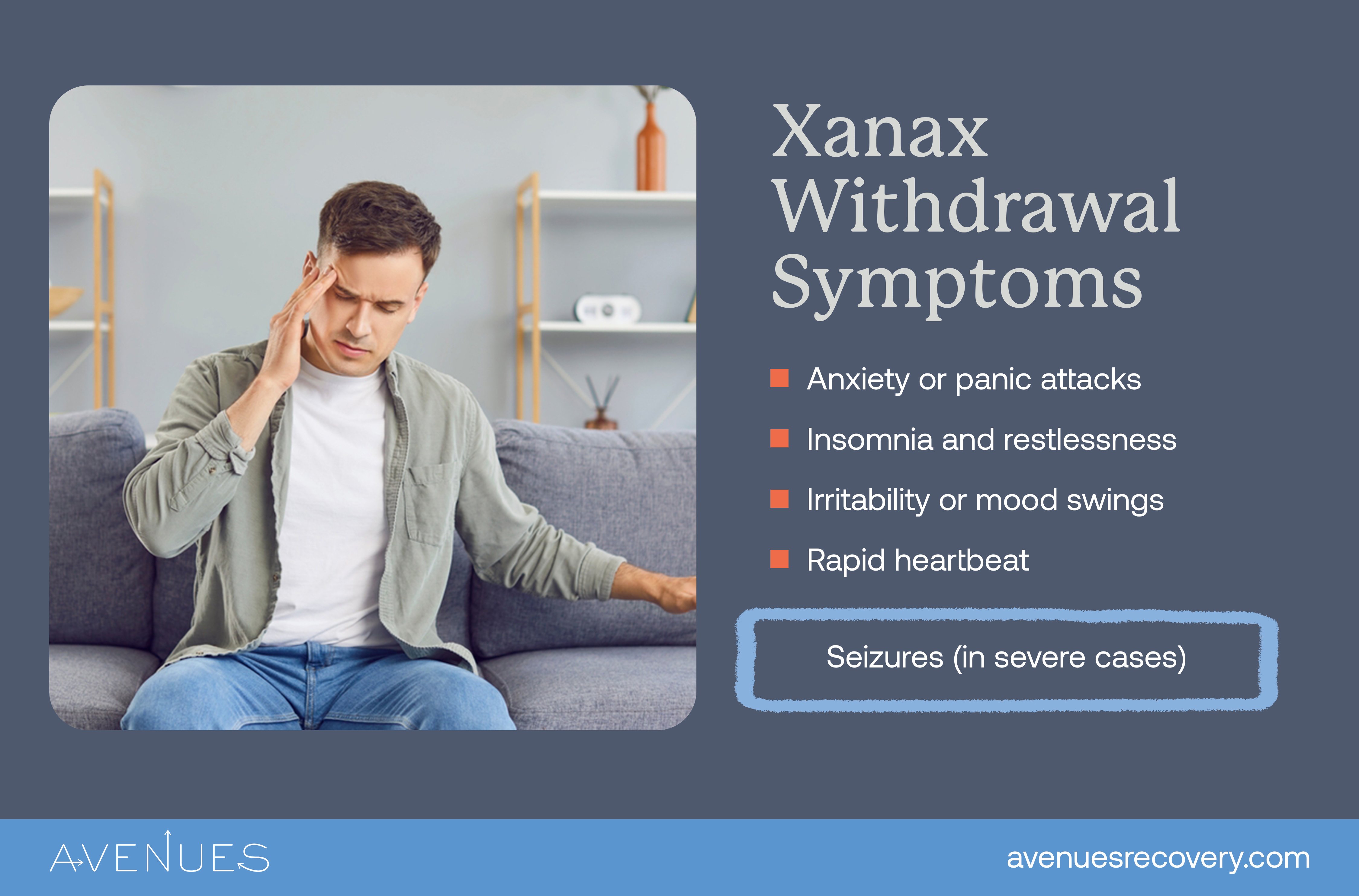
Treatment for Xanax Addiction
Recovering from Xanax addiction requires a comprehensive, individualized plan. At Avenues Recovery, this may include:
- Medical Detox – Safe, supervised tapering of Xanax to prevent complications.
- Inpatient Treatment – 24/7 residential care with therapy, support groups, and holistic healing.
- Outpatient Treatment – Flexible programs allowing clients to live at home while attending therapy and counseling.
- Aftercare & Relapse Prevention – Ongoing support groups, therapy, and trigger management for long-term recovery.
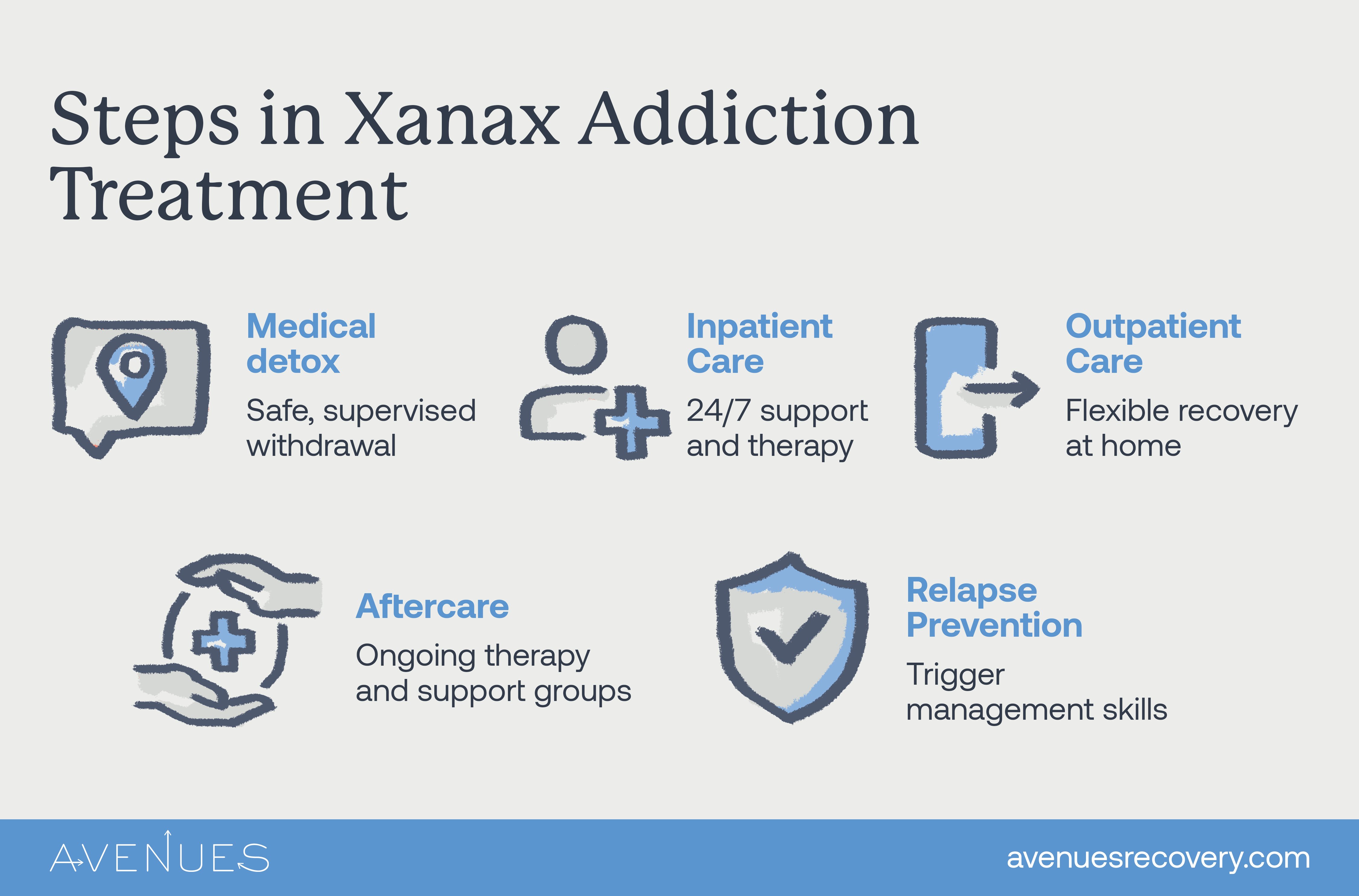
Why Xanax Treatment is Unique
All benzodiazepines carry risks, but Xanax presents unique challenges due to its:
- Short half-life (effects wear off quickly)
- Rapid onset (relief comes fast, encouraging misuse)
This makes withdrawal feel more severe compared to longer-acting benzos. Treatment often requires:
- A slower taper to reduce discomfort
- More intensive symptom monitoring
- Therapy that addresses the underlying anxiety or panic disorder
At Avenues Recovery, we provide dual diagnosis treatment — treating both the addiction and the root causes of anxiety.
Long-Term Recovery
Beating Xanax addiction isn’t just about detox. It’s about building a whole new way of life.
Long-term recovery includes:
- Ongoing therapy (individual and group)
- Support groups (NA, SMART Recovery, or peer-led groups)
- Relapse prevention planning
- Healthy coping skills (mindfulness, fitness, creative outlets)
At Avenues Recovery, we help every client create a personalized aftercare plan, ensuring they leave treatment with tools, support, and confidence to sustain sobriety.
Getting Help
If you or someone you love is struggling with Xanax addiction, professional help can make all the difference.
At Avenues Recovery, we offer a full continuum of care, including:
- Medical detox
- Inpatient and outpatient programs
- Relapse prevention planning
- Ongoing support and therapy
Our compassionate team understands how closely Xanax addiction is tied to anxiety and mental health. That’s why we focus on healing the whole person, not just the addiction.
Contact Avenues Recovery today to begin your journey to recovery.


